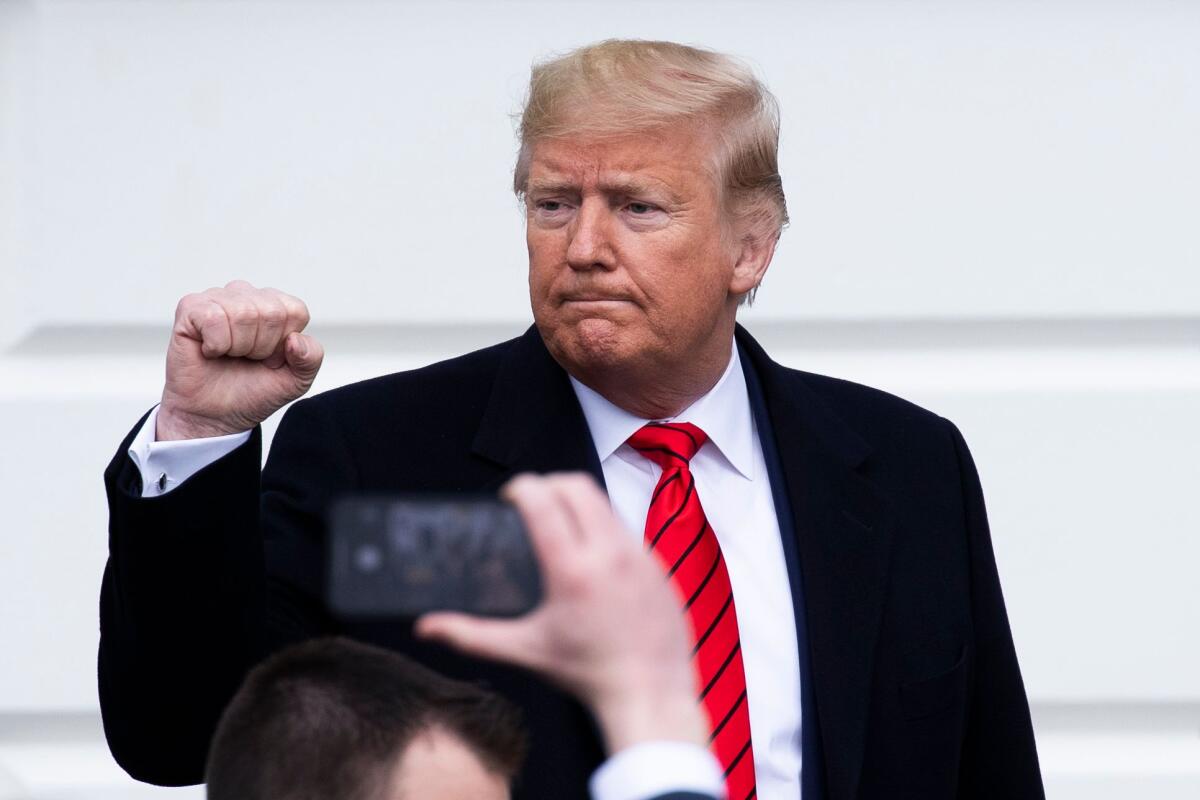Editorial: Convict and remove President Trump — and disqualify him from ever holding office again

The facts are damning and the case is clear. It is time for the U.S. Senate to convict President Trump, remove him from office and disqualify him from holding any “office of honor, trust or profit under the United States.”
It won’t happen, of course — the Senate made that clear Friday when it voted overwhelmingly not to seek any more documents or witnesses. But it should happen.
Not because Trump is a Republican. Not because of his conservative policies. Not as a way to nullify the outcome of the 2016 election. But because he engaged in high crimes and misdemeanors of exactly the sort the founders had in mind when they created the impeachment process in the U.S. Constitution.
The details of those crimes have been laid out a thousand times, but here they are again: Congress voted to give $391 million to Ukraine, an ally that was at war, defending itself against Russia. But Trump withheld that money in a clear violation — an illegal violation — of Congress’ express wishes. He did so not because he had foreign policy disagreements with Congress, but because he hoped to extort from Ukraine’s president what he called “a favor” in return for the money — the announcement of an investigation into groundless accusations against former Vice President Joe Biden that he believed could be useful to him in winning reelection.
In other words, he hijacked national security and foreign policy to induce Ukraine to take actions to smear a prospective political opponent. He abused the power of his office to benefit himself personally. Then, as the second article of impeachment makes clear, he sought to stonewall the investigation by refusing to release documents and ordering his subordinates not to testify in the House inquiry.
It may not come as a surprise to many readers that we support the ultimate punishment for this egregious abuse of power. We had urged the House in December to impeach the president, but did not take a position at that point on how the Senate should vote because we were eager to hear a full-throated defense from Trump and his lawyers. Instead, what we got was a combination of impossible-to-believe rationalizations that did not in any way allay our concerns. We now believe the president should be convicted and expelled from the White House.
The case for conviction might have been even stronger if just a few Republican senators had joined Democrats in voting to summon witnesses — most notably former national security advisor John Bolton and acting White House Chief of Staff Mick Mulvaney — who could have testified about what Trump said to them directly about his decision to withhold the aid. But Sen. Mitch McConnell (R-Ky.) and his Republican caucus opted, in an outrageous dereliction of duty, not to hear from further witnesses, thereby continuing the effort to suppress the facts that began when Trump ordered members of the executive branch not to cooperate with the House inquiry.
If Republican senators were so concerned, as they have repeatedly claimed to be, about the lack of direct evidence, why in the world would they vote against summoning Bolton and other witnesses who spoke directly to the president? The only possible answer: Their priority was to protect Trump (and their own political fortunes), not to establish the truth.
Yet even without hearing from Bolton or Mulvaney or others, the House presented overwhelming evidence of Trump’s misdeeds. The witnesses who did testify described an elaborate effort, spearheaded by Rudolph W. Giuliani, Trump’s personal lawyer, to pressure Ukraine into taking actions intended to benefit not the United States, but Trump’s personal and political interests. That shameful campaign included not just the infamous quid pro quo, but also the character assassination of U.S. Ambassador to Ukraine Marie Yovanovitch, whom Trump removed and later belittled in his conversation with Ukrainian President Volodymyr Zelensky, making the characteristically thuggish comment that “she’s going to go through some things.”
Trump also asked Zelensky to investigate a conspiracy theory that Ukraine, not Russia, hacked Democratic Party computers during the 2016 presidential campaign, an idea dismissed even by Trump’s own FBI director. Trump presumably hoped that if the theory were taken seriously it would free him of the taint of having been elected with Russian assistance.
In defending Trump before the Senate, the president’s lawyers offered a grab bag of political and legal arguments, some of them mutually inconsistent.
Sometimes they echoed Trump’s claim that there was no quid pro quo. “Most of the Democratic witnesses have never spoken to the president at all, let alone about Ukraine security assistance,” said Deputy White House Counsel Michael Purpura (unintentionally making the case for witnesses such as Bolton). But at other points Trump’s lawyers suggested that Trump had a non-selfish reason for deciding to hold up the aid: concerns about the supposed failure of European countries to assist Ukraine or about Ukrainian corruption in general (nowhere does he mention the word “corruption” in his July 25 call with Zelensky), or a suspicion about corrupt conduct by Biden or his son Hunter, who served on the board of a Ukrainian energy company.
Trump’s defenders repeatedly suggested that the president was pursuing the national interest, not his own political advantage, in leaning on Ukraine to open the investigations. Given not only the incriminating testimony in the House but everything we know about Trump, that defies common sense.
The president’s lawyers offered other unpersuasive arguments — for example, that he defied subpoenas because they were issued improperly, or that he withheld the Ukrainian aid because he wanted proof the government wasn’t corrupt — and bizarre legal theories, along with debunked allegations about the elder Biden’s work in Ukraine.
Alan Dershowitz, a member of Trump’s legal team, had the temerity to suggest that, because every public official thinks his election is in the public interest, a president can’t be impeached for asking a foreign country to take actions to benefit the president’s reelection. “If a president does something which he believes will help him get elected in the public interest,” Dershowitz said, “that cannot be the kind of quid pro quo that results in impeachment.” That circular reasoning carries the notion of the imperial presidency to a ridiculous extreme and could be used to justify any number of outrageous behaviors.
This editorial page has criticized Trump for his incompetence, his bigoted rants against immigrants, his cruel and chaotic domestic policies and his shambles of a foreign policy. But those are shortcomings for which the voters should punish him at the ballot box. Impeachment is a remedy for something different — “high crimes and misdemeanors.” And while Trump’s attempt to have Ukraine bolster his reelection is sadly consistent with his transactional and self-serving approach to governing, it crossed a constitutional line into the sort of abuse of power the framers of the Constitution’s impeachment clause feared. That is why House Speaker Nancy Pelosi, who was reluctant to endorse an impeachment inquiry, changed her mind after an intelligence community whistleblower alerted Congress and the nation to Trump’s corrupt conduct.
We too were reluctant to recommend impeachment, because we worried it would be terribly divisive for the country. Besides, it seemed likely from the start that Trump would be acquitted by the Senate, and therefore rather than being constrained, he would be empowered and emboldened. But his egregious misconduct forced the issue. It simply could not be ignored.
Trump’s defenders have argued that the House is “defining impeachment down” because the underlying acts were either not criminal or simply not significant enough to merit removal of the president. But they’re wrong. As the House noted in its first article of impeachment, Trump solicited the interference of a foreign government in the 2020 election to benefit himself and harm his opponent. That’s a terribly serious abuse of the powers given to the president by the voters, powers that are expected to be used on their behalf. It smacks of extortion or bribery; it is a clear perversion of the electoral system. It is the constitutional responsibility of the Senate to consider the case fairly, with an open mind and an eye not toward partisanship, but toward justice.
We’re not expecting that. Just as they voted not to hear any further witnesses, the senators will most likely vote along partisan lines Wednesday to acquit the president that the Republican majority has defended from the start.
But that would be a grievous mistake. The evidence is in and it is incontrovertible. The senators ought to take seriously their oath to assess the case against Trump impartially, and they should vote to find him guilty.
More to Read
A cure for the common opinion
Get thought-provoking perspectives with our weekly newsletter.
You may occasionally receive promotional content from the Los Angeles Times.










